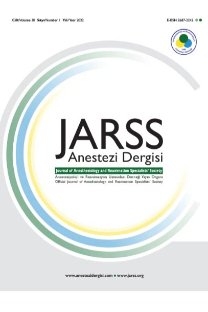Geriatrik, beslenme bozukluğu bulunan ve riskli cerrahi için hazırlanan hastada nütrisyonun önemi: Olgu sunumu
The importance of nutrition in geriatric patients with high risk against surgery: A case report
___
- 1. Wakimoto P, Block G. Dietary intake, dietary patterns, and changes with age: an epidemiological perspective. J Gerontol A Biol Sci Med Sci. 200l:56(2):65-80.
- 2. Wilson MM. Morley JE. Invited review: Aging and energy balance. J Appl Physiol 2003:95(4): 1728-36.
- 3. Nourhashemi F. Andricu S. Rauzy O.et al. Nutritional support and aging in preoperative nutrilion. Curr Opin Clin Nutr Metab Care. 1999;2(l):87-92.
- 4. Sullivan DH, Sun S. Walls RC. Protein-energy undernutrition among elderly hospitalized patients: a prospective study. JAMA 1999;281:2013-9.
- 5. Rapp-Kesek D, Stahle E. Karlsson TT. Body mass index and albumin in the preoperative evaluation of cardiac surgery patients. Clin Nutr 2004:23(6): 1398-404.
- 6. Jakob SM, Stanga Z. Perioperative metabolic changes in patients undergoing cardiac surgery. Nutrition. 2010 Apr:26(4):349-53.
- 7. Waitzberg DL, Saito H. Plank LD, et al. Postsurgical infections are reduced with specialized nutrition support. World J Surg. 2006:30(8): 1592-604.
- 8. Chima CS, Barco K. Dewitt ML. Maeda M. Teran JC. Mullen KD. Relationship of nutriiional status to length of stay, hospital costs, and discharge status of patients hospitalized in the medicine sen-ice. J Am Diet Assoc. l997;97(9):975-8.
- 9. Corish CA. Pre-operalive nutritional assessment. Proc Nun Sik. 1999:5884):821-9.
- 10. Kondrup J, Allison SP. Elia M. Vellas B, Plauth M. ESPEN guidelines for nutrition screening 2002. Clin Nutr 2003:22(4): 415-21. 11. Kondrup J, Kasmussen 1111. Hamberg O. Stanga Z. Nutritional risk screening (NKS 2002): a new method based on an analysis of controlled clinical trials. Clin Nutr 2003;22(3):321-36.
- 12. Campillo B. Richardet JP, Bories PN. Validation of body mass index for the diagnosis of malnutrition in patients with liver cirrhosis. Gastroenterol Clin Biol 2006;30( 10): 1137-43.
- 13. Ulicny KS Jr, Hiratzka LF. Nutrition and the cardiac surgical patient. Chest l992:10l(3):836-42.
- 14. Jeejeebhoy KN. Total parenteral nutrition: potion or poison? Am J Clin Nutr 2001:74(2):160-3.
- ISSN: 1300-0578
- Yayın Aralığı: Yılda 4 Sayı
- Başlangıç: 1993
- Yayıncı: Betül Kartal
Elektif cerrahi hazırlığında preoperatif ve postoperatif anksiyetenin hasta memnuniyeti ile ilişkisi
Yasemin TURHAN, RAŞİT AVCI, Dilek ÖZCENGİZ
Preoperatif biyokimyasal testlerin elektif cerrahi hastalarında etkin kullanımı
Serkan TAPAN, HÜSEYİN KAYADİBİ
Demet COŞKUN, Didem AKÇALI, Hülya ÇELEBİ
Wıllıams sendromlu hastada anestezik yaklaşım: Olgu sunumu
Saban YALÇIN, Harun AYDOĞAN, MAHMUT ALP KARAHAN, Halil NACAR
Morbid obesity in cardiac anesthesia: Retrospective evaluation of thirty morbid obese patients
Aslı DEMİR, ÇİĞDEM YILDIRIM GÜÇLÜ, Bahar AYDINLI, Büşra TEZCAN, Ahmet SARAÇ, Aslı DÖNMEZ, Özcan ERDEMLİ
Göğüs cerrahisi ameliyatları sonrası solunum yetmezliği ve yapay solunum desteği
EVREN ŞENTÜRK, Zerrin Sungur ÜLKE
Cengizhan EMRE, Cihan DÖĞER, İlhami DEMİRKAPU, Dilşen ÖRNEK, Kadriye KAHVECİ, Semih AYDEMİR, Gözde Bumin AYDIN
The effect of circadian rhythm on vecuronium induced neuromuscular block
A.Günay ÜLKÜ, Aysun POSTACI, Özlem FINDIKSAÇAN, Dilşen ÖRNEK, İsmail AYTAÇ, Nermin GÖĞÜŞ
Anestezi pratiğinde sistemik fizik muayenenin önemi: Olgu sunumu
NAMIK NEBİ ÖZCAN, Ahmet BİNDAL, Ayşe ÖZCAN, Hülya BAŞAR
Nadir bir port kateter komplikasyonu: Ayrılma ve fistülizasyon
